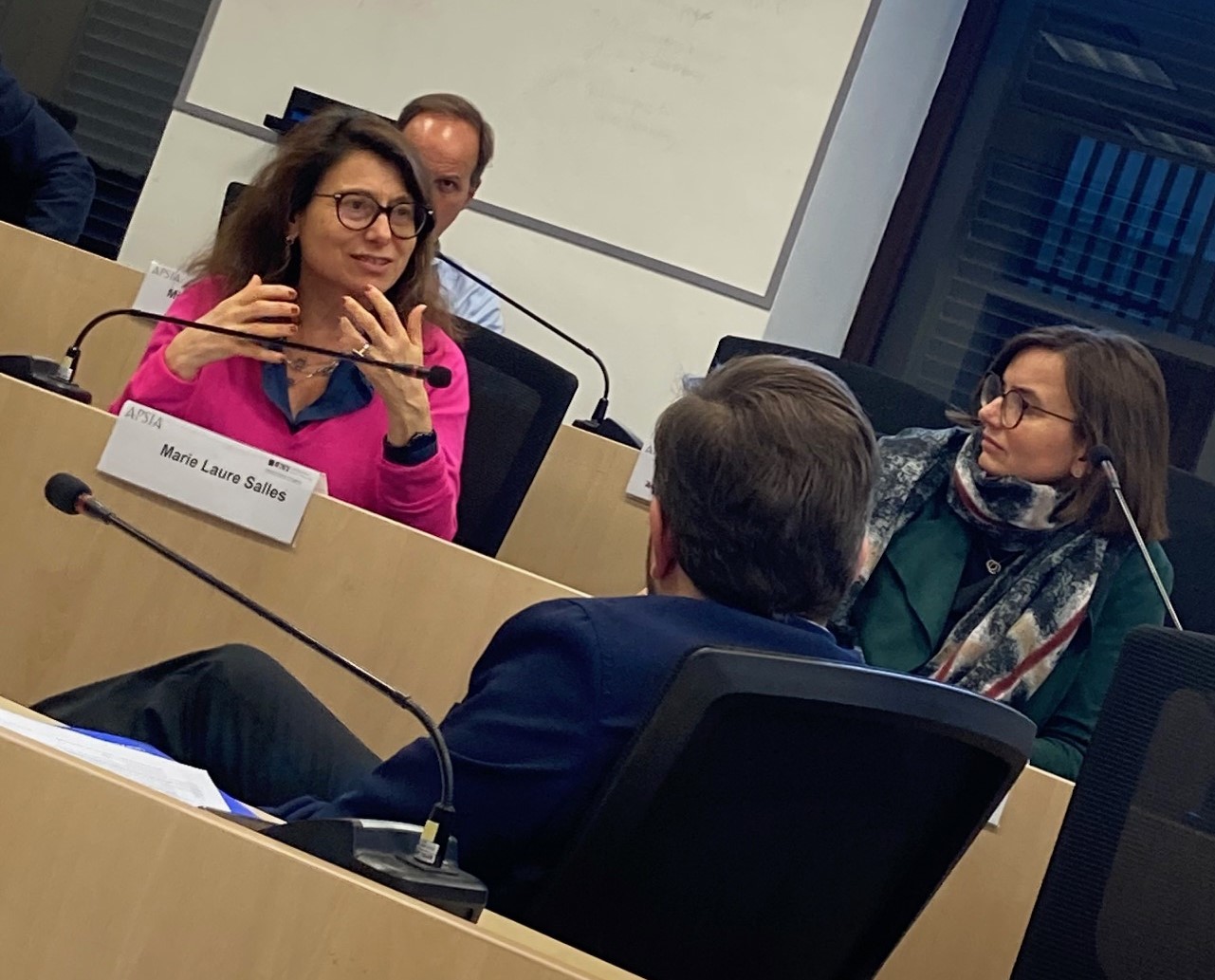Deans Host Annual Meeting in Singapore
On January 12-,13, 2024, 36 leaders from 30 APSIA member, affiliated, and guest institutions met for the annual deans/directors meeting, hosted this year by the National University of Singapore Lee Kuan Yew School of Public Policy.
The meeting began with a welcome by APSIA President Manuel Muñiz. Attendees then shared successes and challenges from the past year. Common successes included a number of school anniversaries, the launch of new mid-career programs, and faculty hiring. Common challenges included the need to navigate increased polarization on campus, budget constraints, and faculty hiring.
APSIA Executive Director Carmen Iezzi Mezzera next detailed the work of the Secretariat during 2023, including the year-long Curriculum Task Force which emerged from the APSIA Strategic Plan (adopted in January 2023).
Task Force Co-Chairs Fritz Mayer, Dean of the University of Denver Josef Korbel School of International Studies, and Carissa Slotterback, Dean of the University of Pittsburgh Graduate School of Public and International Affairs, shared the findings and recommendations of the Task Force. They moderated a discussion of how APSIA schools can and should be adapting their curricula, as well as ways to articulate the value of an APSIA degree to employers and prospective students.
After lunch, attendees could select two of three small group chats.
- Frank Ashley, Acting Dean of the Texas A&M University Bush School of Government and Public Service, moderated a session on Academic Freedom at our Schools and on our Campuses. They compared campus climates in different parts of the world and discussed the worldwide role of universities as places for difficult conversations. Participants shared strategies to remind their communities about fundamental principles like decorum, evidence-based reasoning, and empathy. We have to deal with tough questions, they said, and create school cultures that promote truthful, respectful dialogue.
- Judith Kelley, Dean of the Duke University Sanford School of Public Policy, helped attendees think through how Leveraging Local Programs and Expertise can Enhance International Affairs Education. From trade and migration to tech policy and cross-cultural communication, participants discussed the many intersections between local and global issues. They talked through how to explain the impact of local and global considerations on each other and build local partnerships to enhance global education.
- Kelly Sims Gallagher, Dean ad Interim of the Tufts University Fletcher School, asked participants to consider the differences between building Interdisciplinary and Multi-Disciplinary faculty and curricula. Participants in this conversation shared ways to incentivize collaboration across disciplines. They also talked through the structural considerations of fostering an interdisciplinary faculty, such as its implications for tenure, funding, research, teaching, and burden sharing.
To close out the day, APSIA and the Lee Kuan Yew School of Public Policy co-hosted a public panel, which asked: Multilateralism and the Rules-Based Order: What Remains? To a packed house, panelists Arancha González, Dean of the Sciences Po Paris School of International Affairs, Danny Quah, Dean of the National University of Singapore Lee Kuan Yew School of Public Policy, and Kelly Sims Gallagher explored “pragmatic” ways to keep multilateralism moving forward, especially in trade and climate. Prompted by moderator Manuel Muñiz, the panelists also discussed the geopolitical realities that can undercut multilateral cooperation. Watch the panel here.
To kick off the second day, Lars Strannegård, President of the Stockholm School of Economics, led a discussion looking at AI and the Future of International Affairs Education. Attendees considered how to cultivate “critical, sensible users” of generative AI. They also discussed the need to build students’ capacities for good judgement, analytical reasoning, and contextual thinking. Some schools have adapted their student honor codes to include guidance on the use of generative AI. Some are supporting faculty in adapting their methods of assessment. Participants also asked how best to prepare students for a workplace in which AI-use may be prevalent.
Friday’s small group conversations covered a range of issues.
- Tom French, Vice Dean of the Ritsumeikan University Graduate School of International Relations, shared Strategies for Building Effective Joint Degree / Exchange Programs. Student demand for joint and dual degree programs remains high, attendees said. At the same time, schools need to navigate the structural complexities of admissions requirements, graduation requirements, and the sequencing of curricula. Participants shared examples of how they are building the internal and external structures that make these programs possible.
- Marie Laure Salles, Director of the Geneva Graduate Institute, talked about Linking Curriculum and Professional Development. As professional schools of international affairs, APSIA schools think regularly about how to prepare students for the workplaces of the future while providing a foundational body of general knowledge. Participants talked through ways to weave professional development into the core curriculum, as well as to engage employers and professors of practice in the life of the school.
- Shlomi Dinar, Dean of the Florida International University Steven J. Green School of International and Public Affairs, hosted an open discussion covering a range of topics from strategic planning to faculty development to fundraising.
Friday closed with a look at Geopolitics and the Impact on our Schools, moderated by Arancha González. Attendees described the pressures they face to respond to geopolitical developments, as well as the importance of consistency in those responses. Advance preparation and clear frameworks help to forestall problems, they agreed. There will be tensions between how different stakeholders react to global events, but the work of APSIA schools is to prepare all students to grow in their thinking about key issues. “The world is hard and that’s what we here for,” one attendee said.
For fun during the meeting, attendees enjoyed different social activities, including dinner at the historic Samy’s Curry Restaurant and a guided tour of the life of the Mr. Lee Kuan Yew, first Prime Minister of Singapore.

